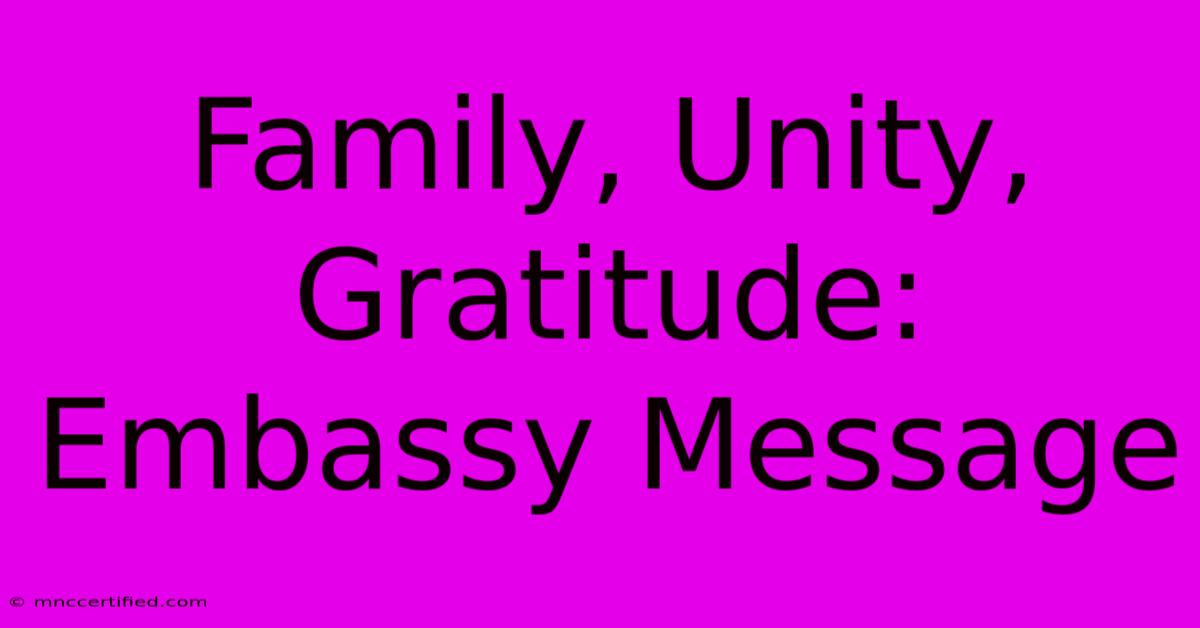Family, Unity, Gratitude: Embassy Message

Table of Contents
Family, Unity, Gratitude: An Embassy's Message of Hope
Embassies serve as more than just diplomatic outposts; they are often beacons of cultural understanding and community engagement. This article explores the vital message of family, unity, and gratitude that many embassies strive to convey, both to their citizens abroad and the host nation's population. We'll delve into how these core values foster stronger international relations and a sense of shared humanity.
The Importance of Family in a Globalized World
In an increasingly interconnected world, the concept of "family" extends beyond blood relations. For embassies, promoting a sense of family among their expatriate communities is paramount. This involves creating opportunities for social interaction, offering support services, and celebrating cultural events that foster a sense of belonging and shared identity. Embassies often organize community gatherings, holiday celebrations, and even sports events to strengthen these familial bonds, reminding citizens abroad that they are not alone. This feeling of community support is crucial for combating feelings of isolation and homesickness, particularly for those far from their home country.
Strengthening Family Ties Through Embassies
Many embassies actively facilitate communication and support for families separated by distance. They might provide assistance with visa applications for family reunification, offer guidance on navigating immigration processes, and even organize online platforms connecting citizens with their loved ones back home. This proactive approach underscores the embassy's dedication to the well-being of its citizens and their families, fostering a sense of trust and loyalty.
Unity: Bridging Cultural Gaps and Fostering Understanding
An embassy's role extends beyond its own citizens. Promoting unity between different cultures is essential for positive international relations. This involves engaging with the host country's population through cultural exchange programs, educational initiatives, and community outreach projects. By showcasing the richness and diversity of their home culture while embracing the local culture, embassies can foster mutual respect and understanding, combating prejudice and promoting harmonious coexistence.
Building Bridges Through Cultural Exchange
Cultural exchange programs, organized by embassies, can significantly impact the perception of different cultures. These programs may involve artist residencies, educational workshops, film screenings, and culinary demonstrations, allowing citizens of the host country to learn about the visiting culture firsthand, fostering a sense of unity and mutual respect.
Gratitude: Recognizing Shared Values and Mutual Benefits
Gratitude is a powerful force in fostering positive relationships. Embassies often express their gratitude to the host country for its hospitality and support, emphasizing the mutual benefits of their presence. This acknowledgment of shared values and common goals strengthens the bond between the embassy and the host nation, contributing to a more stable and productive diplomatic relationship. Public expressions of gratitude, such as official statements or community engagement events, solidify this positive sentiment.
Cultivating Gratitude Through Community Engagement
Participating in and supporting local initiatives demonstrates an embassy's commitment to the host community and cultivates feelings of mutual appreciation. This could involve sponsoring local charities, volunteering time for community projects, or simply participating in local events. Such actions go beyond formal diplomacy and build lasting relationships based on shared values and mutual respect.
Conclusion: A Legacy of Connection
The message of family, unity, and gratitude conveyed by embassies is more than just a diplomatic strategy; it's a powerful expression of shared humanity. By fostering strong relationships within their expatriate communities and building bridges with their host countries, embassies contribute to a more peaceful and interconnected world. The emphasis on these core values strengthens international cooperation, mutual understanding, and lasting positive relationships that benefit all involved. This approach, built on mutual respect and shared goals, provides a solid foundation for future diplomatic success.

Thank you for visiting our website wich cover about Family, Unity, Gratitude: Embassy Message. We hope the information provided has been useful to you. Feel free to contact us if you have any questions or need further assistance. See you next time and dont miss to bookmark.
Featured Posts
-
Spot Vs Pumpkin Pet Insurance
Nov 29, 2024
-
Title Insurance Rates Pa 2023
Nov 29, 2024
-
Amon Ra Montgomery Active For Lions
Nov 29, 2024
-
Europa League Tottenham Lineup Vs Roma
Nov 29, 2024
-
Is Starbucks Open Thanksgiving Day 2024
Nov 29, 2024